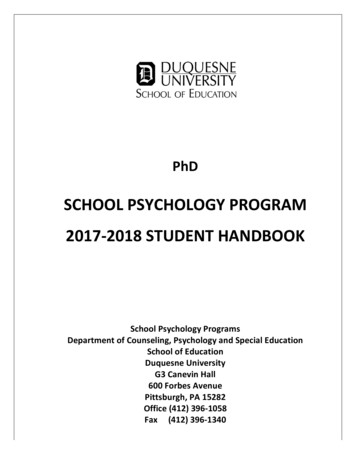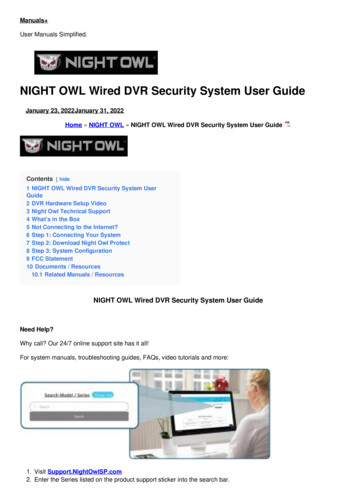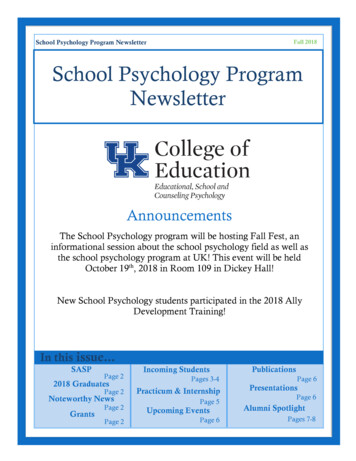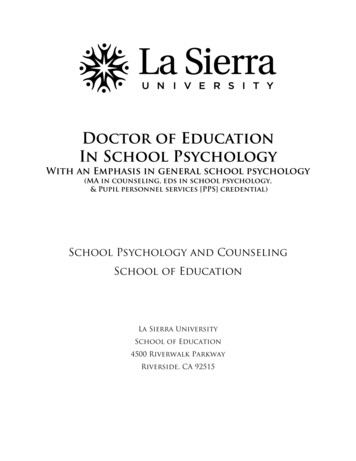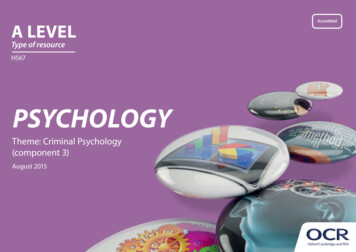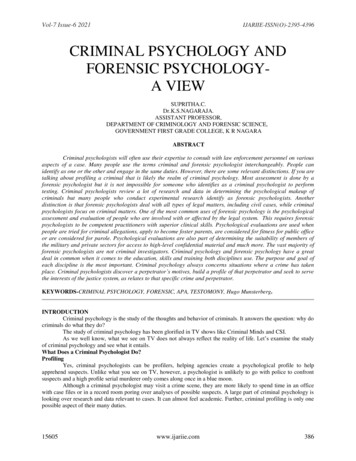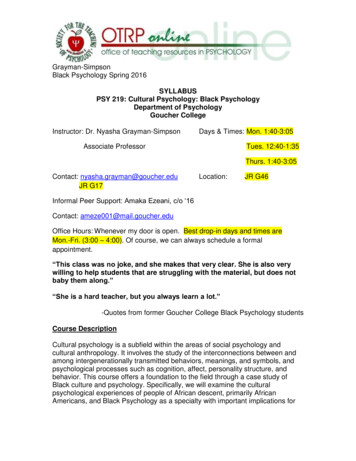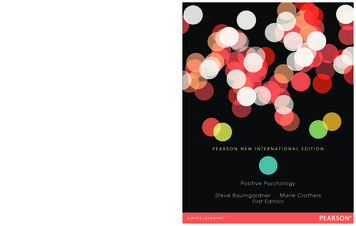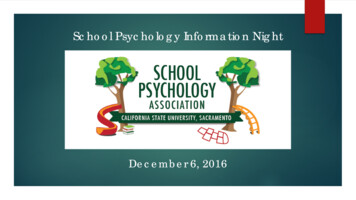
Transcription
School Psychology Information NightDecember 6, 2016
Program MissionThe mission of the California State University, Sacramento (CSUS),School Psychology Program is to promote school psychologypractices that lead to positive learning and life outcomes forchildren and adolescents. To that end the program engages inresearch, the dissemination of knowledge, the promotion ofculturally competent practice, and professional and communityservices that advance school psychology practices in Sacramento,California, the United States, and internationally.
Are you interested in a career that willenable you to: Make a positive difference in the lives of children andadolescents? Support students who have mental health needs? Collaborate with educators, parents, communitymembers, and mental health professionals? Help improve school climate and policies? Rely on research-based evidence to inform decisions? Assess students’ behavioral and learning needs todetermine the best ways to help them?
Who areSchoolPsychologists?
School Psychologists are.Child AdvocatesUnderlying Principles: All children can learn and be successful Decisions should be made based onthe best interests of the children Decisions should be based on provenbest practices
Mental Health ProfessionalsMental Health Services: Administer social-emotional assessments Implement group and individual counseling services Provide professional development and education tostaff and other educators Serve as a mental health advocate for students Provide education for parents
Psycho-EducationalAssessment ExpertsMeeting the Needs of Students: Administer cognitive and psychoeducational assessments Interpret assessments and data to informdecisions as an IEP team member Consult and collaborate with school staff,district personnel, community members,mental health professionals, parents, andstudents
ConsultantsProvide recommendations and interpretations regarding: Instructional, behavioral, and mental health interventions andaccommodations Best practices for school and district policies Special education eligibility criteria, codes, laws, and regulations
Leaders in ResearchSchool psychologists conduct research, write publications, and participate asmembers of professional communities, including: National Association of School Psychology (NASP) California Association of School Psychology (CASP) International School Psychology Association (ISPA)
What is the difference between School CounselorSchool Psychologist At least 3 years of graduate school At least 2 years of graduate school Trained in education and counseling Responsibilities include Individualand group counseling, careerplanning, and course scheduling Employed in public schools anduniversity advisement centers Trained in education and psychology Responsibilities include assessment,consultation, behavioral andacademic intervention, crisisprevention and intervention,individual / group counseling, andprogram evaluation Employed in public and privateschools, private practice, mentalhealth centers, and universities
What is the difference between Child Clinical Psychologist Usually work in a hospital, mentalhealth center, private clinic, oruniversity setting Are not typically trained ineducation, instruction, or classroommanagement Do not focus primarily on the multiplefactors that affect learningSchool Psychologist Focus on how social / emotionalissues, family and environmentalcircumstances, neurological factors,and mental health affect learning
Where do School Psychologists work? Public Schools (83.7%) Colleges and universities (7.4%) Private school (6.2%) Private practice (3.5%) Faith-based schools (2.5%) Hospitals (0.8%) State departments of education (0.6%) Other settings (3.6)
Who are today’s School Psychologists? 77% are women 17.8% were 60 years ofage (in American3.014.6Asian-American/Pacific Islander1.318.3American Indian/Alaskan tino(Curtis, Castillo & Gelley, 2012; NASP, 2010)
Education Level ofSchool Psychologists 29.4% have a master’s degree 53.9% have a specialist degree Most Sac State School Psychology students getboth a master’s degree and an EducationSpecialist degree 16.7% have a doctorate degree(NASP, 2010)
What’s the Job Outlook? Excellent both at present and long-term! Not enough graduates to meet demand School Psychology was named: One of the“100 Best Jobs” in 2015 & 2016 #2 in “Best Social Service Jobs” in 2016 Employment of psychologists is projected to grow 19%(Much faster than average) from 2014 to 2024 One of the groups with the best job prospects will bethose with a specialist or doctoral degree in schoolpsychology.(US News and World Report; Occupational Outlook Handbook of the Bureau of Labor Statistics)
Salary Information 75th Percentile: 89,830 Median: 68,900 25th Percentile: 51,980 NASP: Mean salaries of School Psychologists:– Practitioner (200 Days Contract): 71,320– University Faculty: 77,801– Administration: 93,258– State Department: 75,000 Salaries for school psychologists vary by district, state, and region.(US News and World Report ; NASP, 2010)
Contracts & SalariesFull-Time School-Based Practitioners Contracted days per year:– 60.5% have 170 to 199 contract days (typical school year)– 38.1% have 200 days or more (beyond typical school year) Mean Per Diem Salary 356.60- 180 days 64,188- 190 days 67,754- 200 days 71,320- 210 days 74,886- 220 days 75,452 Mean Ed. S. Per Diem Salary 330.36http://www.nasponline.org/about sp/nasp salaries 09 10.pdf
CSUSSchool PsychologyGraduate Program
Why ChooseCSUS School PsychologyGraduate Program? NASP approved Accredited training program - California Commission on TeacherCredentialing (CCTC) In 3 years (6 semesters) earn your Master’s and Education Specialistdegree (Ed. S.)in School Psychology, and Pupil Personnel ServicesCredential (PPS) Optional-- Licensed Professional Clinical Counselor (LPCC) withadditional coursework and supervised hours which allows you topractice independent clinical counseling. Optional—Licensed Educational Psychologist (LEP) with additionalcoursework and supervised hours which allows you to providepsychoeducational services in an independent private practice**Email brock@csus.edu for more information on optional programs
Excellent Teaching Current Full-Time Faculty Dr. Stephen Brock, Professor and Program Coordinator,School Psychology; NASP President 2014-2015 Dr. Melissa Holland, Assistant Professor & Fieldwork-InternCoordinator Dr. Meagan O’Malley, Assistant Professor Dr. Arlene Ortiz, Assistant Professor Current practicing school psychologists, clinicalpsychologists, behavioral specialists, and other mentalhealth professionals
During the 1st Year, You Will Take courses in group and individualcounseling, psycho-educational assessment,child development, and research methods Begin individual counseling and psychoeducational assessment (GATE testing) withdirect supervision, instruction, and guidancefrom highly qualified, practicing schoolpsychologists and clinical psychologists
During the 2nd Year You Will Take courses in psycho-educational assessment, behavioral assessment andintervention, academic interventions, and much more Work in the field with supervision by practicing school psychologists andparticipate in IEP and SST meetings, observe in classrooms, and run individualand group counseling sessions Conduct psycho-educational assessments (Diagnostics) in the CSUS Centerfor Counseling and Diagnostics Services (CCDS) with direct supervision,instruction, and guidance Finish your 4th (full time) semester with a Master’s in Education, SchoolPsychology
During the 3rd Year, You Will Work as an Intern (usually paid) in a local school district with guidance andsupervision from practicing school psychologists and your professors. Work on your Ed.S thesis or project Complete units and coursework to further prepare you for your future career Graduate with an Education Specialist Degree in School Psychology (Ed.S.) andyour Pupil Personnel Services Credential (PPS)
The Power of the Cohort
Admission Requirements A baccalaureate degree from an accredited institution A minimum of 3.0 grade point average (if GPA is below a 3.0, studentmay be accepted conditionally) and previous transcripts Evidence of registration for or California Basic Education Skills Test (CBEST)passing score Submission of Graduate Record Examination (GRE) scores- from the threesections of the General Test taken within five years of applying to theEd.S. program (not currently required, but strongly encouraged) Passing of the Graduate Writing Assessment Requirement (GWAR), ascore of 4.5 or higher on the writing section of the GRE is also accepted
Pre-requisite Requirements Abnormal Psychology Education of Exceptional Children Intro to Behavioral Statistics (or similar basic statistics coursework) Intro to Counseling Power, Privilege, and Self-Identity Tutoring Children Reading Course and/or Experience Drugs and Behavior*Similar coursework covering topics from the above courses may be used with department approval. Provideevidence that coursework taken meets requirements of the courses listed and discuss with advisor/programcoordinator once you have been admitted in the program.
Application & Interview TipsDemonstrate : High performance in demanding programs or employment (GPA,strong references from professors and employers) Progress toward prerequisites (enroll for upcoming semesters) Your knowledge of what school psychologists do Prepare questions to ask your interviewers Show your excitement! Interview concludes with a spontaneous writing sample.
Acceptance & Graduation RatesFor Fall 2016 cohort:80 applications45 interviews19 students admitted3 year graduation rate: 80%
Applications for Fall 2017 are DUEFebruary 1, 2017 Should complete University Application online by Monday, January16,2017 so as to be able to upload the Supplemental Application. Supplemental Program Application Packet deadline is Wednesday,February 1, 2017 /educationspecialist-school-psychology.html http://www.csus.edu/coe/apply/graduate.html
Excellent OpportunityMark Your Calendar!CSUS 2017 School Psychology Conference: Staying Informed When: Thursday, January 19th & Friday, January 20th Where: Sac State Campus What: Presentations by, Dr. Stephen Brock, Dr. Meagan O’Malley,Dr. Melissa Holland, Dr. Arlene Ortiz and other mental healthprofessionals. Register TODAY! Email for orianareis@csus.edu a registration form
Advising Questions If your last name starts with A through E, contact Dr. Stephen Brock for advisingPhone: (916) 278-5919 Office: Brighton Hall 225 Email: brock@csus.edu If your last name starts with F through L, contact Dr. Melissa Holland for advisingPhone: (916) 278-6639 Office: Brighton Hall 227 Email: mholland@csus.edu If your last name starts with M through S, contact Dr. Meagan O’Malley for advisingPhone: (916) 278-3459 Office: Brighton Hall 225 Email:meagan.omalley@csus.edu If your last name starts with T through z, contact Dr. Arlene Ortiz for advisingPhone: (916) 278-5539 Office: Brighton Hall 227 Email: arlene.ortiz@csus.edu
Contact Information forCurrent Students Outreach Coordinators Summer Smith summerleesmith@csus.edu Jaclyn Sayklay jaclynsayklay@csus.edu Marisa Depaulo marisadepaulo@csus.edu Please feel free to contact us with any additional questions you have aboutthe application process, the program, or the field from a student’sperspective.
Websites to CheckoutNational Association of School Psychologistswww.nasponline.orgCSUS School Psychology Association Pagesacstateschoolpsych.weebly.com/
SourcesCurtis, M. J., Lopez, Castillo, J. M., & Gelley, C. (2010). School Psychology 2010: Demographics,employment, and the context for professional practices- part 1. Retrieved /nasp-research-center/nasp-studiesCurtis, M. J., Lopez, A. D., Batsche, G. M., Minch, D., & Abshier, D. (2007, March). Status report onschool psychology: A national perspective. Paper presented at the annual convention of theNational Association of School Psychologists, New York, NY.Fagan, T. K., & Wise, P. S. (2007). School psychology: Past, present, and future (3rd ed.). Bethesda,MD: NASP.Hosp, J. L., & Reschly, D. J. (2002). Regional differences in school psychology practice. SchoolPsychology Review, 31, 11-29. Retrieved from http://naspjournals.org/loi/spsrThomas, A., & Grimes, J. (2008). Best practices in school psychology V. Bethesda, MD: NASP.
Questions?
Mean salaries of School Psychologists: - Practitioner (200 Days Contract): 71,320 - University Faculty: 77,801 - Administration: 93,258 - State Department: 75,000 Salaries for school psychologists vary by district, state, and region. (US News and World Report ; NASP, 2010)
